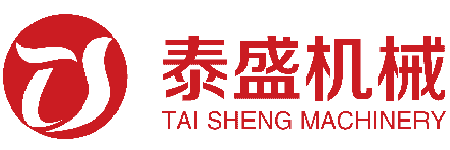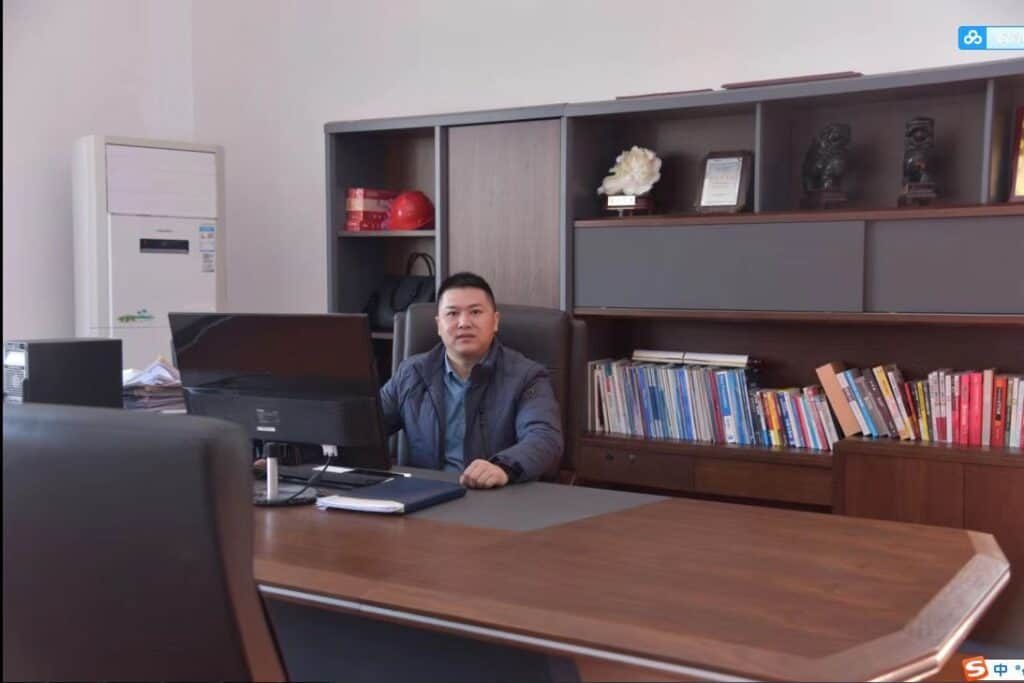Each part’s appearance, cleanliness, and surface quality are crucial in metal finishing. For manufacturers and industrial buyers, selecting the appropriate surface preparation approach is essential for product quality and manufacturing performance. Two of the most commonly discussed techniques are sandblasting and abrasive blasting — terms often used interchangeably but with important distinctions. This article examines the differences between these methods and how to select the appropriate method based on your needs.
What Is Abrasive Sandblasting?
The process of abrasive sandblasting which is known as sandblasting uses abrasive materials accelerated at high speed to clean etch or texture mainly metal surfaces. The term “sandblasting” suggests the use of sand; modern applications often use alternative media like steel grit, glass beads, aluminum oxide, walnut shells, or ceramic grit, depending on the finish required and environmental regulations.
This process is highly effective for removing rust, paint, scale, or other surface contaminants, and preparing parts for coating or welding. It’s widely used in industries such as construction, automotive, aerospace, and heavy manufacturing.
Taisheng Machinery designs automated sandblasting systems that improve efficiency and produce uniform surface treatment and safe working environments. Our solutions focus on environmental protection and worker health, with enclosed systems and dust collectors that reduce airborne particles and noise.
What Is Abrasive Blasting?
Abrasive blasting refers to any blasting technique that employs abrasive materials to modify or clean surfaces. This includes abrasive blast cleaning, grit blasting, and micro-abrasive blasting. Unlike traditional sandblasting, abrasive blasting covers a variety of techniques tailored for specific materials, including heat-sensitive or intricate components.
This process can be used for precise shaping, surface texturing, or edge profiling, making it ideal for electronics, aerospace components, and delicate assemblies. The abrasives used vary in hardness and size, allowing a high degree of customization.
Our precision abrasive blasting equipment offers excellent control and adaptability, ensuring that even complex components receive uniform treatment without compromising integrity.
Abrasive Blasting vs. Sandblasting: How Do They Differ?
While the terms overlap, here’s a breakdown of their key differences:
| Feature | Sandblasting | Abrasive Blasting |
| Media | Traditionally silica sand | Wide range of media types |
| Health & Safety | Risk of silicosis | Media selected for safety & performance |
| Terminology | Outdated but widely used | Modern, technically accurate |
| Flexibility | Limited by sand properties | Tailored to specific applications |
In short: All sandblasting is abrasive blasting, but not all abrasive blasting is sandblasting.
Which Blasting Process Is Right for Your Project?
At Changzhou Taisheng Machinery, we understand that choosing the right surface treatment method is crucial for your business. Whether you’re focused on improving production speed, extending the life of your equipment, or ensuring safety for your workers, we’re here to help you find the most efficient and cost-effective solution. Our team offers personalized advice to make sure you choose the best blasting method for your unique needs. If you’re unsure whether sandblasting, abrasive blasting or another method is right for your project, feel free to reach out to us. We’re ready to provide expert guidance and support to help you make the best decision.
Common Types of Abrasive Blasting
We produce and distribute systems for all primary blasting procedures at Taisheng Machinery:
Manual Sandblaster
The manual sandblaster uses compressed air to launch abrasive blasting media consisting of sand or grit to clean or prepare surfaces. The method proves best for small-scale projects that demand precision because operators manually control the flow and pressure. This equipment operates in abrasive blast cleaning applications to eliminate rust, scale, or old coatings from metal, concrete, or stone.
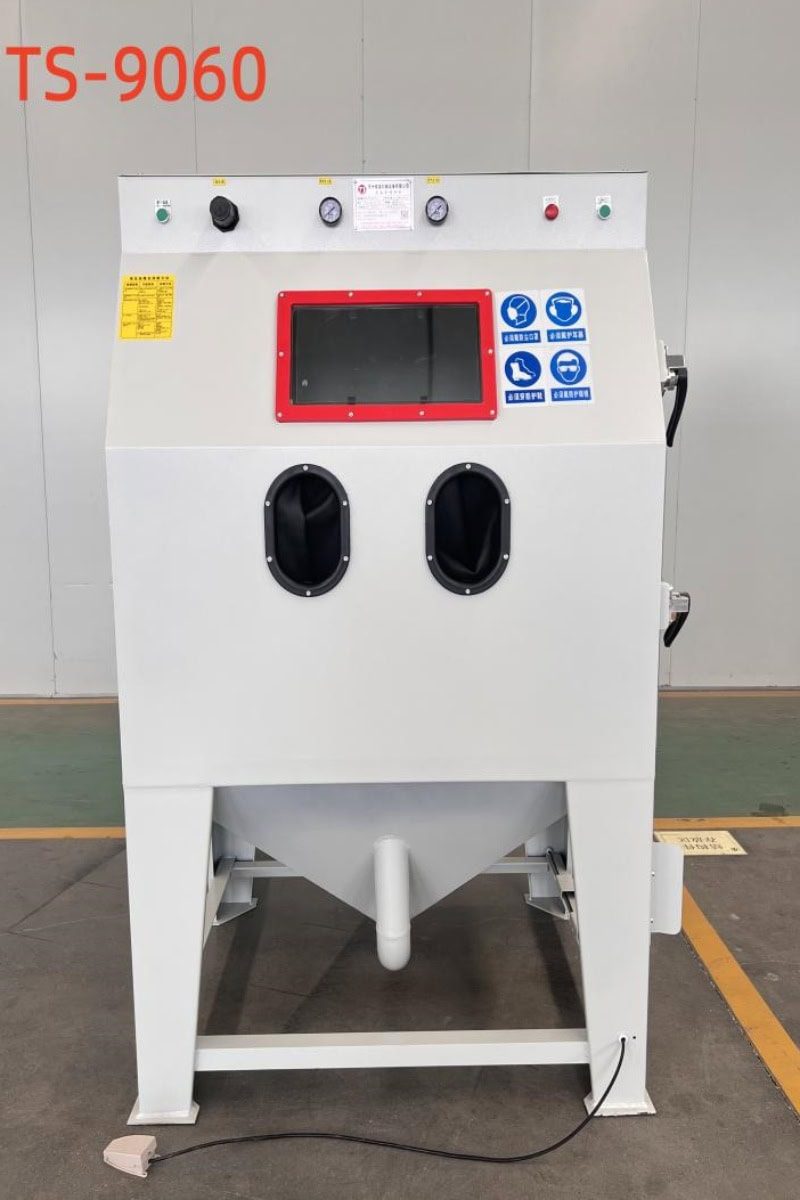
Main Features of the Manual Sandblaster Cabinet:
- Easy loading with a right-side door.
- Scratch-resistant LED lighting for clear visibility.
- Foot pedal control for hands-free blasting.
Applications of the Manual Sandblaster Cabinet:
- Provides uniform satin finishes on various metals.
- Removes rust, scale, and carbon from metals.
- Strips paint and coatings for rework.
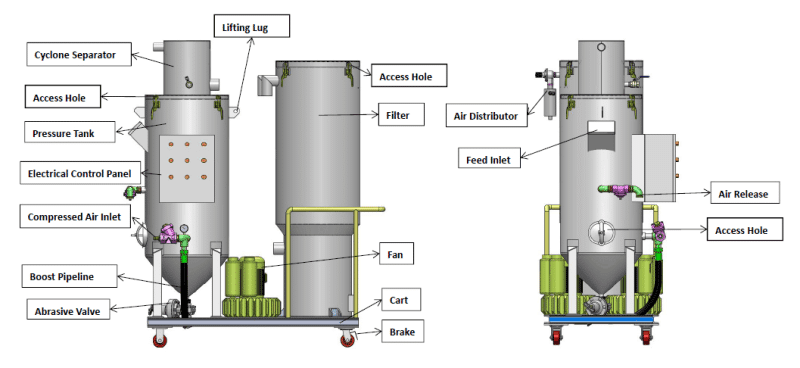
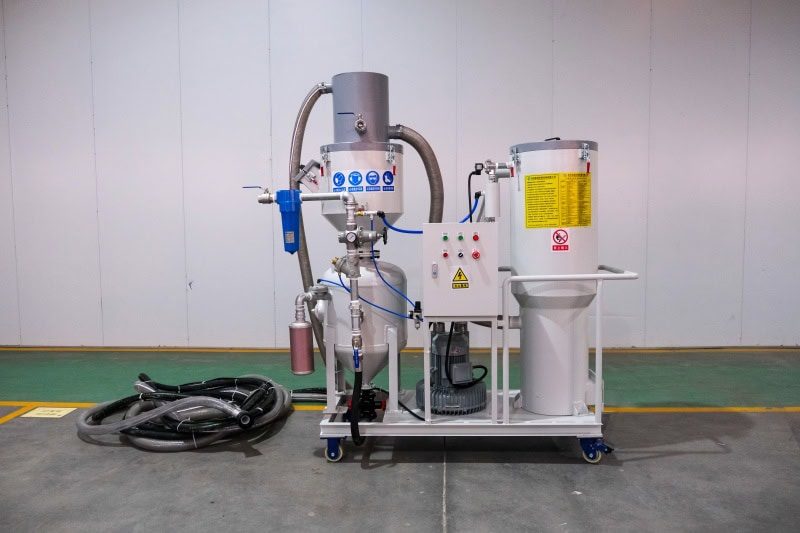
Main Features of the Vacuum Blasting Machine:
• Eco-friendly design: Automatic sand, rust, and dust recovery, with a 99% sand recovery rate.
• Adjustable working radius to suit different worksite needs, with surface treatment levels reaching Sa2.5-3.
• Portable car-type box structure: Rainproof, dustproof, and easy to move.
• Automatic sand circulation and dust filtration for a clean, pollution-free environment, meeting GB103328-10333-89 air dust hygiene standards.
Applications of the Vacuum Blasting Machine:
• It is very good at removing rust, scale, and coatings from the metals.
• Safely cleans delicate surfaces like aircraft and precision parts.
• It is used for cleaning castings, mold,s, and metal surfaces before further processing or painting.
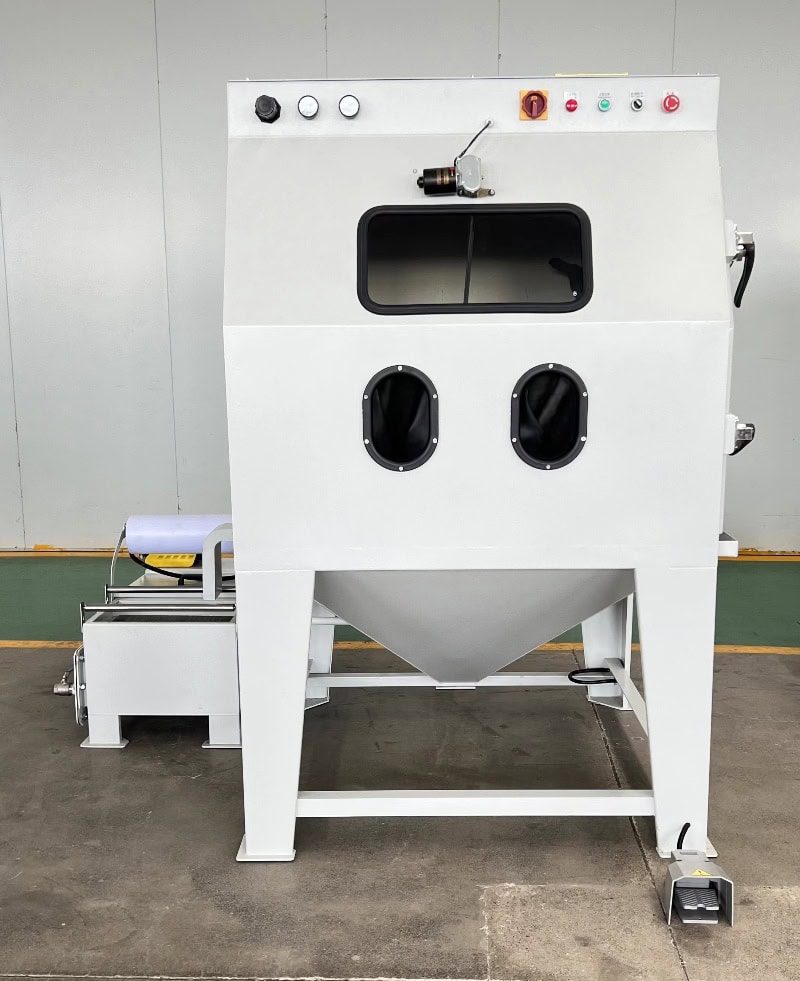
Features of the Wet Blasting Machine:
• Stainless Steel Construction: Durable and corrosion-resistant.
• Non-electric Airbag Switch: Simple, safe, and reliable control for sand pump and compressed air.
• Efficient Sand Pump: Easy to start with a long lifespan.
• Compact Design: Ideal for small to medium-sized workpieces
Applications of the Wet Blasting Machine:
• Surface Treatment: For pretreatment, matte finishing, and polishing.
• Cleaning Parts: Cleans forgings, castings, welded parts, and electrical components.
• Delicate Item Cleaning: Ideal for jewelry, crystal glass, and other sensitive materials.
• Fine Abrasives: Works best with glass beads and diamond sand for precise finishes.
Automatic Sandblaster
An automatic sandblaster is a fully automated system that performs abrasive blasting without manual intervention. It offers consistent, high-speed cleaning or surface preparation, making it ideal for industries like metalworking or “oil pipelines”. The system ensures precise results with minimal operator input, making it efficient and cost-effective.
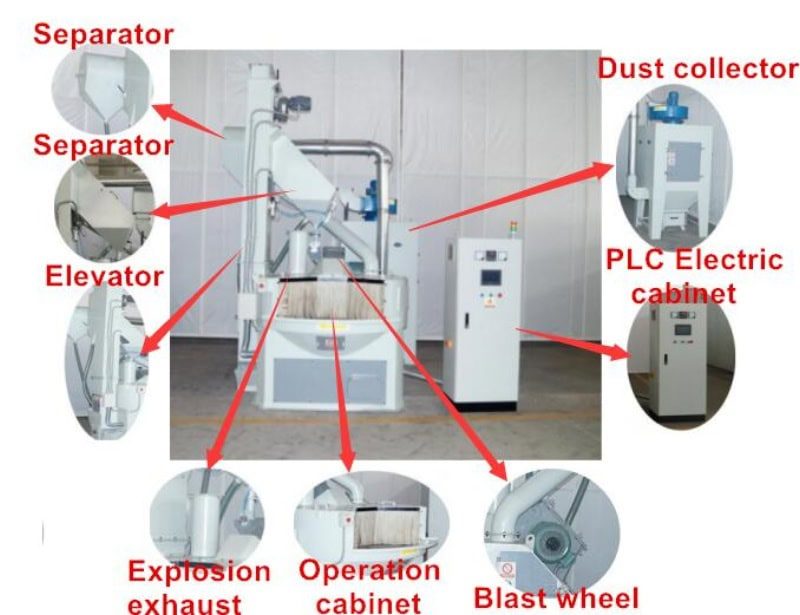
Main Features of the Airless Blasting Machine:
• Designed to replace traditional belt conveyor sandblasting machines.
• Suitable for processing mobile phone shells, laptop covers, and other similar electronic products.
• Equipped with advanced features for high-temperature coating and plating applications.
• Ideal for treating precise electronic components like mobile phone cases, computer enclosures, and communication devices.
Applications of the Airless Blasting Machine:
• It is used for the efficient preparation of products for high-temperature coating and plating like non-stick pans and gas stove cores.
• Widely used for cleaning and surface treatment of electronic products, including mobile phones and computers.
• Perfect for products requiring precise sandblasting before further processing, such as paint or plating.
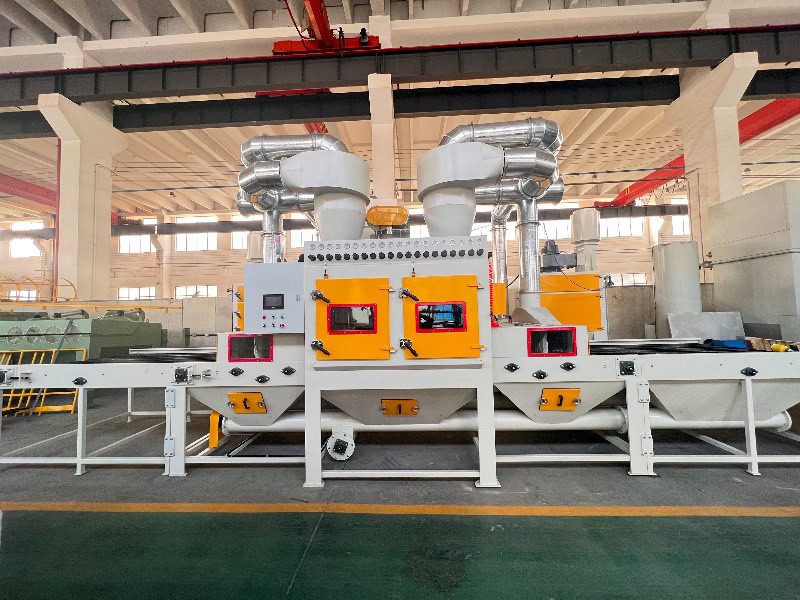
Main Features of the Conveyor Blasting Machine:
• Optimized Blast Coverage: Blast head systems are strategically positioned to ensure uniform coverage across components.
• Automatic and Energy-efficient Operation: Can interface with material handling systems for unmanned operation, with PLC control to reduce energy consumption.
• Durable Construction: Built with heavy-duty welded steel housing for long-lasting performance.
Applications of the Conveyor Blasting Machine:
• Blasts Flat and Complex Components: Perfect for plates, profiles, and various-shaped parts.
• Efficient Small Part Blasting: Ideal for high-speed blasting of small items like toasters, badges, and laptop cases.
• Treats Long Components: Suitable for processing long tube and bar materials.
• Versatile Material Use: Works effectively on stainless steel, carbon steel, aluminum, glass, and more.
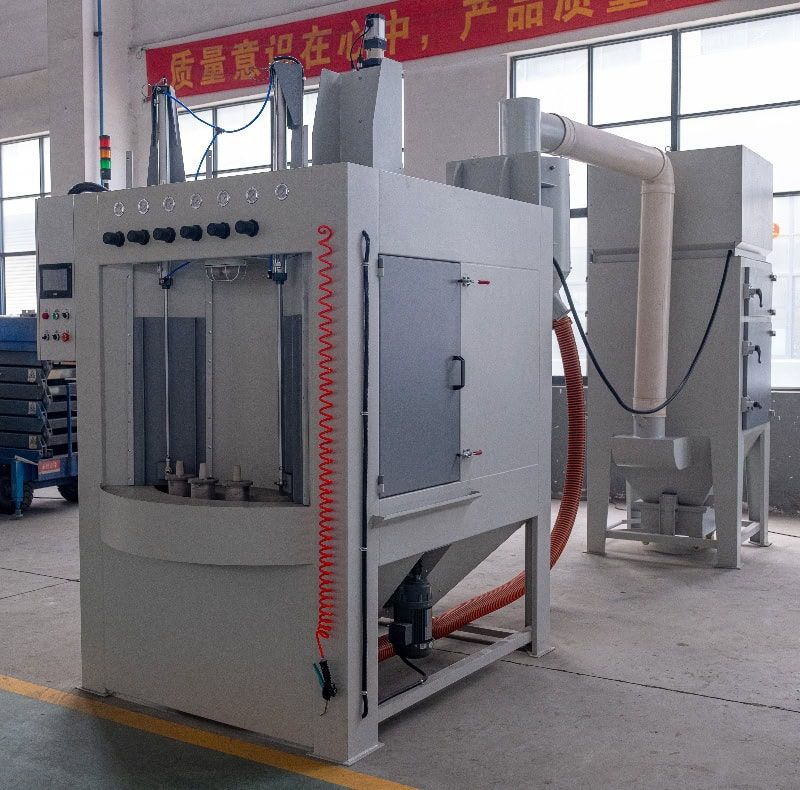
Main Features of the Automatic Rotary Turntable Sand Blast Equipment:
• Automatic Rotation: Workpieces are automatically positioned for efficient blasting.
• PLC Control: Fully automated with programmable control for ease of use.
• Adjustable Gun Swing: Ensures thorough cleaning at all angles.
• Durable Construction: Built for heavy-duty, mass-production environments.
Applications of the Automatic Rotary Turntable Sand Blast Equipment:
• Mass Production: Ideal for blasting pans, cylinders, and square box-type items.
• Internal and External Blasting: Perfect for both inside and outside surfaces.
• Wide Range of Products: Works with items like electric kettles, bakeware, and stainless steel basins.
• Compatible with Various Abrasives: Suitable for aluminum oxide, glass beads, and ceramic beads.
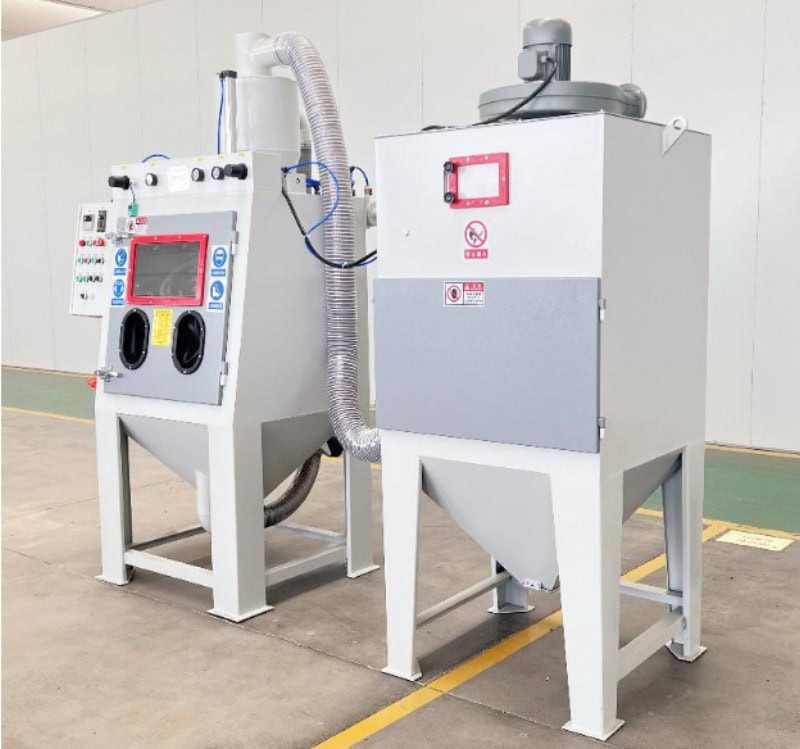
Main Features of the Tumble Basket Sand Blasting Machine:
• The equipment performs well for cleaning small metallic pieces along with plastics and thermosetting parts.
• Automated Operation: Easy to use with adjustable basket rotation speed.
• Abrasive Recycling: Equipped with a cyclone separator for efficient abrasive usage.
• High Blasting Efficiency: A remote-controlled blasting gun ensures excellent results.
Applications of the Tumble Basket Sand Blasting Machine:
• Small Parts Cleaning: Perfect for bolts, fasteners, nuts, and tools.
• Versatile Materials: Suitable for zinc aluminum die casting, PMMA, and sintered metal products.
• Pneumatic Tools: Ideal for cleaning parts like pneumatic screwdrivers.
• Abrasive Compatibility: Works with aluminum oxide, glass beads, and zircon sand.
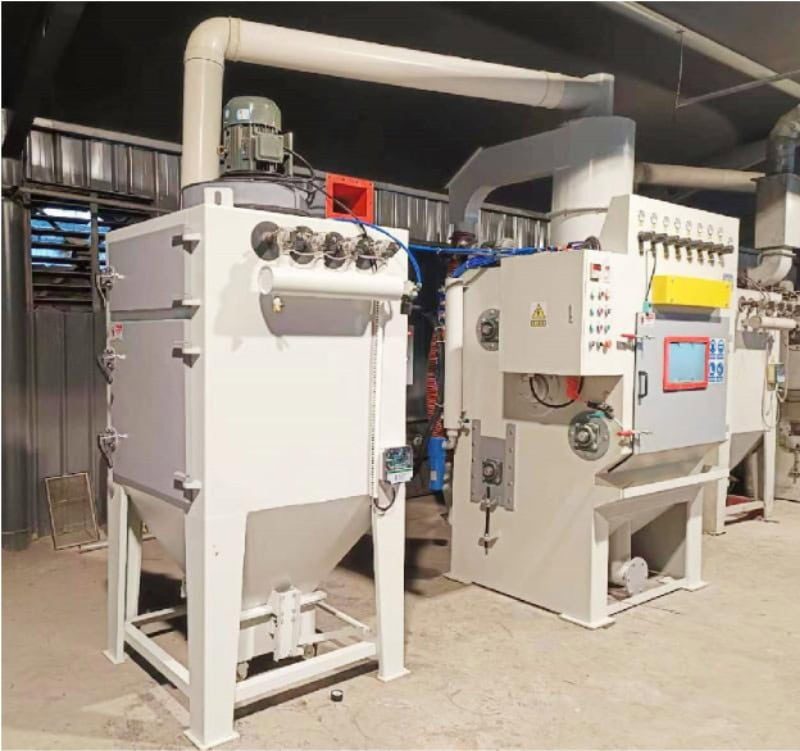
Main Features of the Rubber Belt Tumble Blasting Machine:
• The machine operates automatically to tumble parts for standard cleaning and finishing while users set parameters including media flow rates and blast pressures.
• Durable Rubber Lining: The machine features a rubber-lined interior to withstand years of heavy-duty cleaning and shot peening.
• Adjustable Settings: Users can control time, media type, pressure, tumble speed, and blast duration to optimize finishing results.
Applications of the Rubber Belt Tumble Blasting Machine:
• Small Parts Cleaning: Ideal for bolts, PMMA, zinc aluminum die castings, and tools.
• Versatile for Various Materials: Effective for cleaning sintered metal products and pneumatic screwdrivers.
• Abrasive Compatibility: Works with aluminum oxide, glass beads, and zircon sand for optimal results.
Mold Sandblater:
Main Features of the Tire Mold Automatic Sandblaster:
• Automated Operation: Features an electric rotating table and automatic entry/exit for efficient mold handling and consistent cleaning.
• High Capacity: Capable of handling tire molds that measure up to 1500mm in diameter and have a maximum loading capacity of 1.5 tons.
• Precise Blasting Control: Provides adjustable blasting parameters that guarantee optimal cleaning outcomes across different tire mold sizes and shapes.
The Tire Mold Automatic Sandblaster operates to eliminate rust along with dirt and contaminants from tire molds thus creating suitable conditions for additional processing or coating.
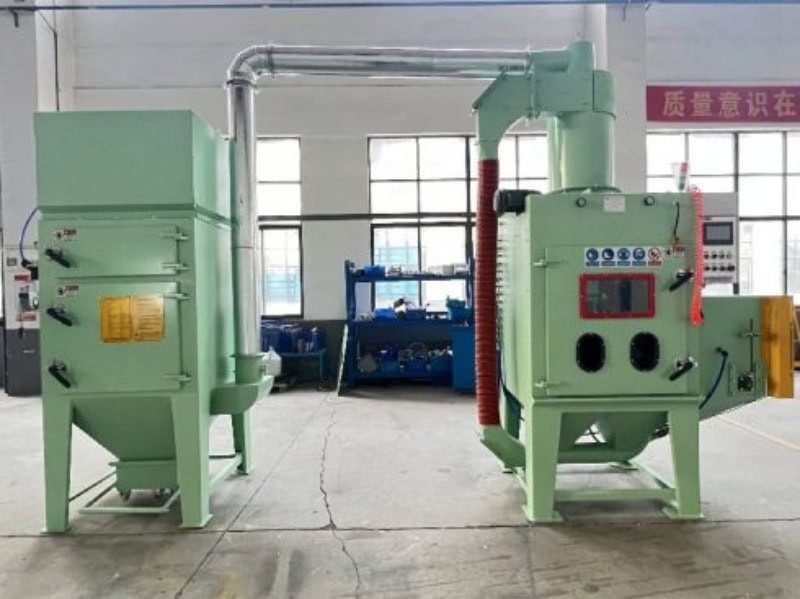
Features:
• The system efficiently removes surface impurities to boost wear resistance as well as adhesion and corrosion protection capabilities. 2. The size and hardness of the impact abrasive can be adjusted to achieve different effects.
• The equipment can efficiently handle parts that have concave or horizontal features that typical machines cannot access.
• The steel pipe and thread exhibit a matte finish which does not reflect light while the coverage reaches 100%
Suitable for sandblasting of steel pipe end threads
Our company provides advanced sandblasting machines together with Wheel Blast Machines and Sand Blast Booths which offer total surface treatment solutions. The Wheel Blast Machines operate at high efficiency for high-volume production and serve well in automotive and metalworking sectors for cleaning surface strengthening and smoothing.
Our company provides detailed information about our products that can boost your production efficiency and surface quality improvement.
How to Choose the Right Blasting Method:
The selection process for blasting solutions requires examination of three main factors:
• Material type ‒ Aluminum, steel, plastic, glass, etc.
• Finish quality ‒ Smoothness, anchor profile depth, coating compatibility
• Production scale ‒ High-volume vs. custom jobs
• Safety/environmental ‒ Dust containment, operator health, noise control
The Taisheng team specializes in creating customized equipment setups which include:
• Automatic abrasive recovery systems
• Eco-friendly, low-noise designs
• Precision control for high-tolerance parts
Why Choose Taisheng Blasting Equipment?
Since its inception nearly two decades ago Changzhou Taisheng Machinery Co., Ltd. has become the go-to surface preparation provider for major global brands across the aerospace automotive energy, and electronics industries. Our commitment to:
- Professionalism – Industry-leading engineering and R&D
- Authority – Deep expertise in surface treatment processes
- Friendliness – Personalized guidance and responsive service
- Technical Excellence – Custom-built solutions with smart automation
- After-Sales Service – Long-term maintenance and global support
ensure you get more than just a machine—you get a lasting solution.
Get Expert Help Choosing the Right Blasting Equipment
Need Help Choosing the Right Blasting Equipment?
Choosing the right blasting equipment can make all the difference in achieving the best results for your project. Whether you’re aiming to improve efficiency, lower costs, or upgrade your systems, Taisheng Machinery is here to help. Our team is ready to guide you in finding the perfect abrasive blasting solution for your needs.
Do you have questions or want to learn more? Don’t hesitate to reach out to us—we’d be happy to help!
📞 [Contact Our Team for Expert Advice]
👉 [Explore Our Blasting Equipment]
